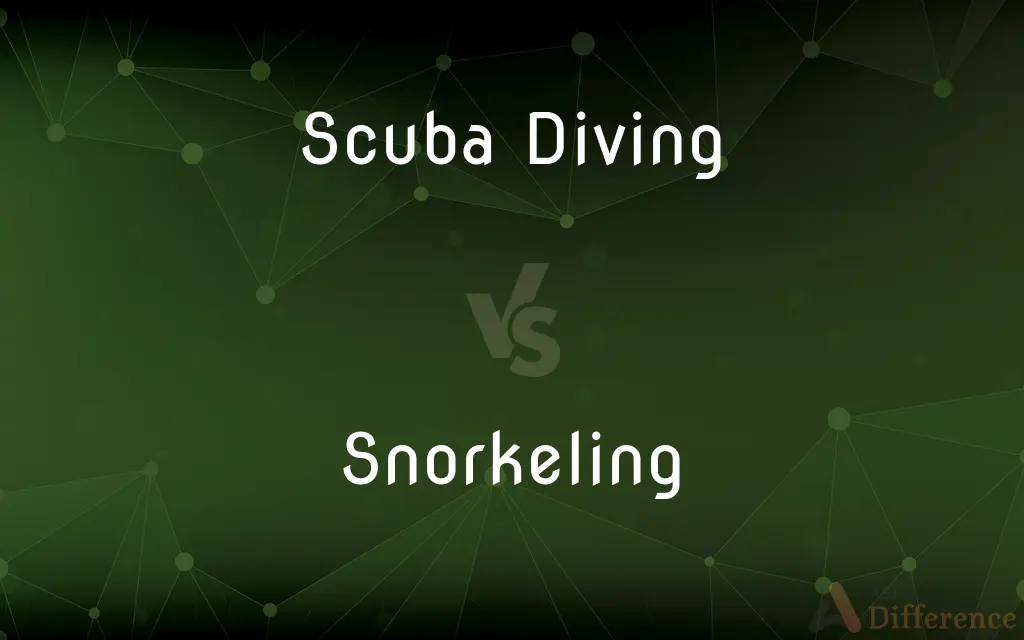Scuba Diving vs. Snorkeling — What's the Difference?
By Tayyaba Rehman & Fiza Rafique — Published on February 14, 2024
Scuba diving involves underwater exploration with a self-contained underwater breathing apparatus, allowing for deep dives. Snorkeling is swimming at the water's surface using a snorkel to breathe, ideal for observing shallow marine life.

Difference Between Scuba Diving and Snorkeling
Table of Contents
ADVERTISEMENT
Key Differences
Scuba diving and snorkeling are two popular aquatic activities that offer unique ways to explore underwater environments. Scuba diving equips participants with a self-contained underwater breathing apparatus (SCUBA), enabling them to breathe underwater and dive to significant depths. This activity requires certification and training to manage the equipment and understand diving physics, ensuring safety during dives. Scuba diving allows for extended underwater exploration, providing opportunities to observe marine life, coral reefs, and underwater wrecks up close.
In contrast, snorkeling is a more accessible activity that involves floating on the water's surface while breathing through a snorkel tube. It requires minimal equipment, typically just a snorkel, mask, and fins, making it suitable for all ages and skill levels. Snorkeling is popular in shallow waters where coral reefs and schools of fish are visible from the surface. It doesn't require extensive training or certification, allowing participants to quickly engage with the marine environment.
The equipment for scuba diving and snorkeling significantly differs. Scuba diving gear includes a tank filled with compressed air or a mix of gases, a regulator for breathing, buoyancy control devices, and often a wetsuit for thermal protection. Snorkeling gear is more straightforward, focusing on the snorkel for breathing, a mask for clear underwater vision, and fins for efficient movement.
The depth and duration of underwater exploration vary greatly between scuba diving and snorkeling. Scuba divers can venture to depths far beyond the reach of snorkelers, exploring for extended periods as their air supply allows. Snorkelers stay at the surface, limiting their exploration to areas where sunlight penetrates and marine life is visible from above.
Both scuba diving and snorkeling offer unique perspectives on the underwater world, each with its advantages. Scuba diving provides a comprehensive, immersive experience, while snorkeling offers simplicity and accessibility. The choice between the two depends on the individual's interest, skill level, and desire for adventure.
ADVERTISEMENT
Comparison Chart
Equipment
SCUBA gear, including tanks, regulator, and wetsuit
Snorkel, mask, and fins
Depth
Can explore deep underwater environments
Limited to surface-level viewing
Training
Requires certification and training
Minimal to no training required
Duration
Limited by air supply and decompression limits
Limited by physical comfort and conditions
Accessibility
Requires investment in gear and training
Easily accessible with minimal equipment
Compare with Definitions
Scuba Diving
Allows for deep dives beyond snorkeling depths.
Scuba diving enables exploration of deep reefs and marine life.
Snorkeling
Swimming at the water's surface with a snorkel to breathe.
Snorkeling over the coral reef was an unforgettable experience.
Scuba Diving
Requires certification for safe diving practices.
Before her first dive, she completed a scuba diving certification course.
Snorkeling
Accessible to all ages and skill levels.
The whole family enjoyed snorkeling during their beach vacation.
Scuba Diving
Gear includes a regulator, buoyancy control device, and fins.
Proper scuba diving gear is essential for a safe and enjoyable dive.
Snorkeling
Requires minimal equipment, typically a mask and snorkel.
All you need for snorkeling is a good mask and a snorkel.
Scuba Diving
Underwater exploration using a self-contained breathing apparatus.
He saw a shipwreck while scuba diving in the Caribbean.
Snorkeling
Popular in shallow waters for observing marine life.
They went snorkeling to see the colorful fish near the shore.
Scuba Diving
Utilizes compressed air or gas mixtures for breathing underwater.
Scuba diving tanks are filled with compressed air to allow extended underwater stays.
Snorkeling
No certification or extensive training needed.
She tried snorkeling for the first time and loved it immediately.
Snorkeling
A breathing apparatus for swimmers and surface divers that allows swimming or continuous use of a face mask without lifting the head to breathe, consisting of a tube that curves out of the mouth and extends above the surface of the water.
Snorkeling
A retractable vertical tube in a diesel-engine submarine that contains air-intake and exhaust pipes for the engines and for ventilation, permitting extended periods of submergence at periscope depth.
Snorkeling
To swim or dive under water with a snorkel and often with a face mask and fins.
Snorkeling
The act of swimming using a snorkel.
Snorkeling
Present participle of snorkel
Snorkeling
Skin diving with a snorkel
Common Curiosities
Can children participate in scuba diving?
Yes, but they must meet age requirements and complete a junior certification.
How long does a typical scuba dive last?
Dive times vary but often last between 30 to 60 minutes.
What marine life can I see while snorkeling?
Snorkelers can see fish, coral, and sometimes sea turtles or rays in shallow waters.
Is snorkeling safe for non-swimmers?
Non-swimmers can snorkel with flotation devices and supervision.
Do I need to know how to swim to scuba dive or snorkel?
Basic swimming skills are recommended for both activities.
Can I rent scuba diving or snorkeling gear?
Yes, many resorts and dive shops offer gear rentals.
Do I need a wetsuit to snorkel or scuba dive?
Wetsuits are recommended for thermal protection, especially in cooler waters.
What happens if I use up all my air while scuba diving?
Divers learn to monitor air supply and ascend safely before running out.
How deep can you go when scuba diving?
Recreational dives typically go up to 130 feet, depending on certification level.
What's the best time of year to snorkel?
Snorkeling conditions are best during warm, calm weather with clear waters.
Are there health restrictions for scuba diving?
Certain medical conditions may require a physician's approval before diving.
Is it expensive to get scuba certified?
Costs vary but include coursework, pool sessions, and open water dives.
How do I prevent water from getting into my snorkel?
Modern snorkels have features to minimize water entry, and techniques like "blowing out" help clear water.
Can I practice scuba diving in a pool?
Initial scuba training often occurs in a pool before open water dives.
Can I take photos while snorkeling or scuba diving?
Yes, waterproof cameras and housings are available for underwater photography.
Share Your Discovery

Previous Comparison
Bamboo Flooring vs. Hardwood Flooring
Next Comparison
1080i vs. 720pAuthor Spotlight
Written by
Tayyaba RehmanTayyaba Rehman is a distinguished writer, currently serving as a primary contributor to askdifference.com. As a researcher in semantics and etymology, Tayyaba's passion for the complexity of languages and their distinctions has found a perfect home on the platform. Tayyaba delves into the intricacies of language, distinguishing between commonly confused words and phrases, thereby providing clarity for readers worldwide.
Co-written by
Fiza RafiqueFiza Rafique is a skilled content writer at AskDifference.com, where she meticulously refines and enhances written pieces. Drawing from her vast editorial expertise, Fiza ensures clarity, accuracy, and precision in every article. Passionate about language, she continually seeks to elevate the quality of content for readers worldwide.
















































